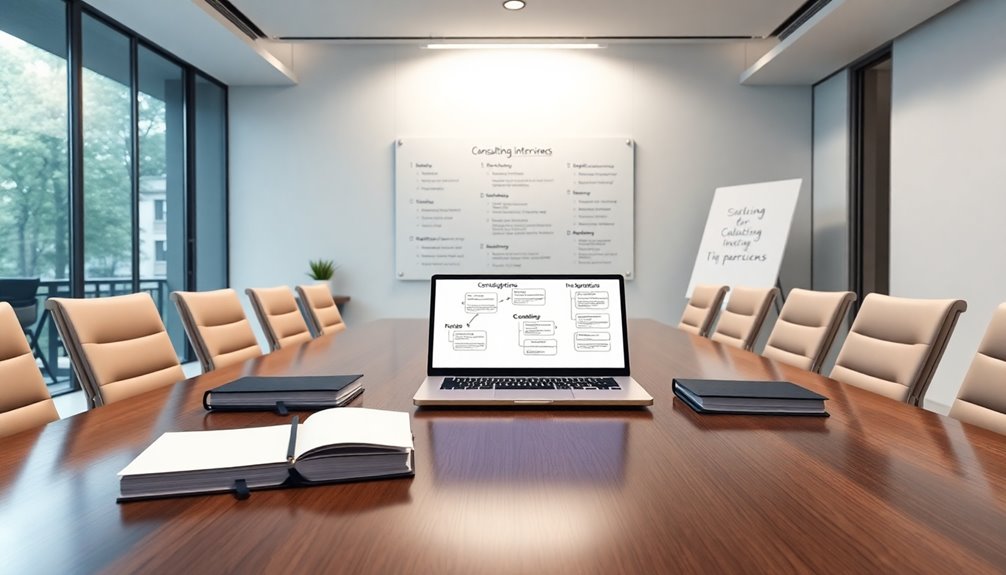To master consulting interviews, you need to be ready for essential questions that gauge your skills, experience, and overall fit. Be prepared to discuss your strengths and weaknesses, leadership style, and motivations for consulting. Highlight your relevant experience and notable accomplishments with specific examples. Demonstrating your problem-solving skills through techniques like SWOT analysis is vital. Engage positively with clients through active listening and tailored communication. Finally, show an understanding of industry trends and challenges. There's much more to explore, so uncover additional insights to sharpen your interview strategy further.
Key Takeaways
- Prepare to discuss your strengths and weaknesses to demonstrate self-awareness and personal growth during the interview.
- Highlight your leadership style and experiences to showcase your team management capabilities and collaborative approach.
- Articulate your motivations for pursuing a consulting career, emphasizing passion and alignment with industry values.
- Share specific professional accomplishments, detailing the impact and lessons learned from past consulting projects.
- Familiarize yourself with industry trends and challenges to provide informed, strategic recommendations during client discussions.
General Interview Questions

When you enter a consulting interview, you'll often face general questions that help employers gauge your fit for the role. Expect inquiries about your strengths and weaknesses, as these reveal your self-awareness and ability to improve.
You might also discuss your leadership style, which demonstrates how you handle team dynamics and challenges. Employers will be interested in understanding your motivations for pursuing a consulting career and your interest in their organization.
Be prepared to talk about your professional accomplishments, highlighting specific examples that showcase your skills.
Finally, articulating your future goals can give employers insight into your long-term vision and how it aligns with the position. These questions set the stage for deeper discussions later in the interview.
Experience and Background

A strong background in consulting is essential for demonstrating your qualifications in interviews.
You'll want to highlight any prior consulting experience, as it showcases your familiarity with the industry. Discuss your involvement in proposal writing and how you collaborated with teams on projects.
Be prepared to identify client needs and explain how you structured your approach to meet those needs. Interviewers often focus on recent consulting projects, so share the outcomes and lessons learned from those experiences.
Emphasize your ability to adapt to different client scenarios and how your background has prepared you for the challenges of consulting.
This concrete evidence not only validates your expertise but also sets you apart from other candidates.
Problem-Solving Skills

Tackling complex problems head-on is essential in consulting, and your problem-solving skills will often define your success. You need to adopt a structured approach, combining analytical thinking with creativity. Here's a quick overview of essential problem-solving techniques:
| Technique | Description |
|---|---|
| Root Cause Analysis | Identify the underlying issues |
| Brainstorming | Generate diverse ideas and solutions |
| SWOT Analysis | Assess strengths, weaknesses, opportunities, and threats |
| Data Analysis | Use data to inform decisions |
Developing these skills not only enhances your effectiveness but also builds your confidence during interviews. Highlight your ability to analyze data, identify trends, and propose innovative solutions to impress potential employers.
Leadership and Teamwork

When you lead a team, your approach can greatly influence outcomes. Here are four key aspects to focus on:
- Adaptability: Be ready to pivot strategies when challenges arise.
- Collaboration: Foster an environment where team members feel comfortable sharing ideas.
- Conflict Resolution: Address disagreements swiftly to maintain team cohesion.
- Recognition: Celebrate team achievements to boost morale and motivation.
Additionally, continuous learning is essential for leaders to inspire their teams and drive innovation.
Client Engagement Strategies

Engaging clients effectively requires a deep understanding of their needs and preferences. Start by actively listening to their concerns and goals, which builds trust and rapport.
Tailor your communication style to match theirs; some clients prefer detailed discussions, while others appreciate concise updates. Always prioritize their objectives in project planning to guarantee alignment and satisfaction.
When faced with difficult clients, stay adaptable and patient, focusing on collaborative solutions. Use regular check-ins to assess progress and solicit feedback, making adjustments as necessary.
Industry Knowledge

A strong understanding of industry knowledge greatly enhances your ability to engage clients effectively. When you know the ins and outs of their sector, you can tailor your approach and provide relevant solutions.
Here are four key aspects to focus on:
- Stay Updated: Regularly read industry publications and reports to keep abreast of trends and challenges.
- Research Competitors: Understand what competitors are doing to better position your recommendations.
- Analyze Client Backgrounds: Conduct thorough research on potential clients to identify their unique needs and circumstances.
- Recognize Challenges: Be aware of significant hurdles facing the industry to anticipate client concerns and propose viable strategies.
Consulting Methodologies

Consulting methodologies are vital tools that guide consultants in delivering effective solutions to clients. By familiarizing yourself with various frameworks, you can enhance your problem-solving skills and adapt to diverse client needs.
Techniques for market analysis and client assessment help you understand the context and challenges your clients face. Additionally, implementing strategic recommendations is important for achieving project objectives and ensuring client satisfaction.
You'll also want to evaluate project outcomes meticulously, as this informs future approaches and improves overall effectiveness. Remember, the ability to adapt your methodologies based on client-specific circumstances not only demonstrates your expertise but also strengthens client relationships.
Embrace these methodologies to elevate your consulting practice and drive impactful results for your clients.
Cultural Fit Assessment

Finding the right cultural fit is essential for success in consulting. When interviewing, you'll want to demonstrate your alignment with the company's values and mission.
Here are some key areas to focus on:
- Values Alignment: Show how your personal values match the company's core beliefs.
- Work Environment: Discuss how you contribute positively to team dynamics and collaboration.
- Ethical Practices: Emphasize your commitment to integrity and ethical decision-making.
- Diversity Collaboration: Highlight your ability to work effectively with diverse teams, fostering inclusivity.
Communication Techniques

Effective communication is key to fostering a positive cultural fit within consulting teams. You should tailor your communication style to match client preferences, as this builds rapport and trust.
Recognizing different communication mediums, like email or phone calls, can enhance your interactions considerably. When meeting with clients, adjust your approach based on their comfort level to improve collaboration.
Employ active listening to gauge client needs; this not only shows you care but also guarantees you fully understand their concerns.
Finally, maintain clarity and conciseness in your messaging. Avoid jargon and deliver your points straightforwardly to prevent misunderstandings.
Conflict Resolution Methods

Conflict can arise in any team setting, but knowing how to navigate it can make all the difference.
You'll want to employ effective conflict resolution methods to keep your team on track. Here are four strategies to contemplate:
- Identify Sources: Recognize potential conflict triggers early to address them proactively.
- Encourage Open Communication: Foster an environment where team members feel comfortable discussing issues without fear of backlash.
- Find Common Ground: Focus on shared goals to facilitate agreement and strengthen teamwork.
- Document Resolutions: Keep a record of how conflicts were resolved to prevent similar issues from resurfacing in the future.
Frequently Asked Questions
What Motivates You to Pursue a Career in Consulting?
When you think about pursuing a career in consulting, you'll likely feel motivated by the opportunity to solve complex problems and drive impactful change.
The dynamic nature of consulting excites you, as it allows you to work with diverse clients and industries.
You're enthusiastic to learn continuously and collaborate with talented professionals.
Ultimately, the chance to make a difference while growing your skills fuels your passion for this challenging and rewarding field.
How Do You Stay Updated on Industry Developments?
In the ever-evolving world of consulting, staying informed is like maneuvering through a constantly shifting landscape.
You read industry publications, follow relevant blogs, and engage with thought leaders on social media.
Attending conferences and webinars keeps your knowledge fresh, while networking with peers offers invaluable insights.
You also set aside time for continuous learning, ensuring you're not just keeping up but staying ahead in your field.
It's all about being proactive and curious.
Describe a Challenging Project and How You Overcame Obstacles
When you describe a challenging project, focus on specific obstacles you faced. For instance, you might've encountered tight deadlines or resource limitations.
Share how you prioritized tasks, rallied your team, and communicated effectively with stakeholders to overcome these hurdles. Highlight the strategies you used, like brainstorming sessions or risk assessments, and emphasize the positive outcome, showcasing your problem-solving skills and resilience in a high-pressure environment.
What Role Does Ethics Play in Your Consulting Practice?
Ethics in consulting is like a compass guiding your path through murky waters. You know it shapes your decisions and actions, ensuring you don't stray from integrity.
By prioritizing transparency and honesty, you build trust with clients and colleagues alike. This commitment not only enhances your reputation but also fosters a culture of responsibility.
When challenges arise, you rely on your ethical framework to navigate, ensuring that your solutions benefit everyone involved.
How Do You Prioritize Tasks When Managing Multiple Projects?
When you're managing multiple projects, prioritize tasks by evaluating deadlines and impact.
Start by listing all tasks and identifying which ones are urgent and important. Use tools like timelines or project management software to visualize your workload.
Communicate with your team to understand their needs and adjust priorities as necessary.
Regularly review your progress and be flexible, adapting your plan to guarantee you meet key objectives efficiently.
Conclusion
By preparing for these key areas, you're not just readying yourself for an interview; you're setting the stage for a successful consulting career. Are you ready to showcase your strengths and stand out in a competitive field? Embrace the challenges of problem-solving, communication, and client engagement, and you'll not only impress your interviewers but also lay a strong foundation for your future. Remember, confidence and clarity are your best allies in this journey.
Eugene brings a fresh, dynamic voice to our platform as one of our talented Writers. Specializing in research-driven content, he explores the latest findings in psychology and personal growth, translating them into actionable insights for our readers. Eugene’s work is fueled by a curiosity about what makes us tick and a desire to help others unlock their potential.










